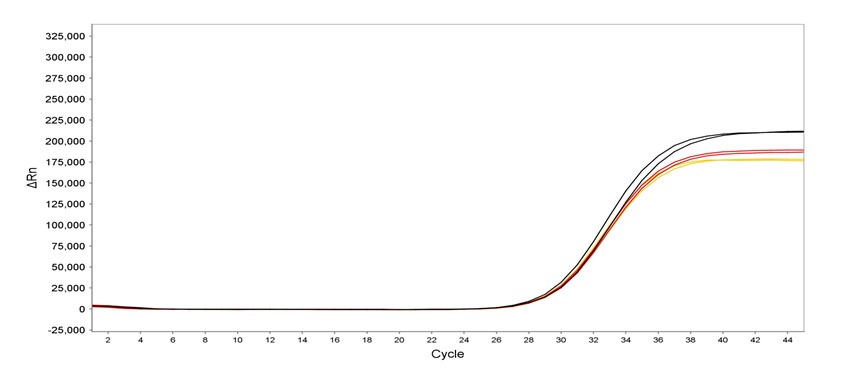Lyo-Ready Inhibitor-Tolerant qPCR/RT-qPCR Master Mixes
A variety of PCR inhibitors inherent to clinical and environmental samples can negatively impact the sensitivity and accuracy of a molecular assay. Conventionally, to overcome this, specimens undergo processing before testing. However, extraction technologies are not 100% efficient and can impact the amount of target nucleic acid available for testing. Some PCR inhibitors can also co-elute following purification, reducing the efficiency, particularly in quantitative PCR multiplex assays and may even induce false-negative assay results.
Have questions about a product?
Contact us to learn more about Meridian’s molecular or immunoassay reagent portfolio. We want to hear from you!
Lyo-Ready Inhibitor-Tolerant qPCR Mix, 4x

Liquid (black), lyophilized (red) and lyophilized with 5% stool extract (yellow) formats of Lyo-Ready Inhibitor-Tolerant RT-qPCR Mix, (MDX185). The results demonstrate the lyophilized mixes retain the ability to efficiently amplify to the same level as the liquid mix, even in the presence of inhibitors, with the same reproducibility.
Lyo-Ready Inhibitor-Tolerant qPCR Mix, MDX184
Universal, high concentration, inhibitor tolerant qPCR master mix, for direct amplification from crude lysates or inhibitor-rich samples such as urine, cerebral spinal fluid (CSF), blood, sputum, saliva and stool.
Documents & Resources
Lyo-Ready Inhibitor-Tolerant RT-qPCR Mix, MDX185
Universal, high concentration, inhibitor tolerant RT-qPCR master mix, for direct amplification from crude lysates or inhibitor-rich samples such as urine, cerebral spinal fluid (CSF), blood, sputum, saliva and stool.
Documents & Resources
Description
Molecular diagnostic tests are progressively moving towards lyophilized formats. Meridian’s universal Lyo-Ready Inhibitor-Tolerant qPCR/RT-qPCR formulations are ready-to-use quantitative PCR supermixes, containing all components except primers, probes, and template for direct qPCR and RT-qPCR. They are also glycerol-free and include specialized excipients that preserve the mixture as it is exposed to various conditions including freezing, vacuum, and dehydration during lyophilization. After lyophilization they can be shipped and storage at ambient temperature, extended shelf-life, reduced operating steps and potential errors and increased flexibility in sample volume. They are designed for developing qPCR multiplex assays that require minimal sample processing and fast turn-around times (TAT) without compromising sensitivity, for low copy number samples.
Specifications
| Description | A combination of the latest advances in buffer chemistry and PCR enhancers and stabilizers, together with high quality enzymes, dNTPs, MgCl2 and lyophilization compatible excipients. Designed to be used in PCR reactions for highly reproducible, accurate assay results in the presence of inhibitors, even after lyophilization. |
| Concentration | 4x |
| Appearance | Clear, colorless solution |
| Hot Start | Antibody mediated |
| Application | Probe-based, real-time PCR, two-step RT-qPCR, one-step RT-qPCR |
| Sample type | cDNA, crude or purified RNA and/or DNA |
| Presentation | 1 vial |
| Storage | -20 °C |
| Mix stability | See outer label |
| Consistency | ±0.5/1 Ct variance between test and reference sample |
| DNA Contamination | None detected in PCR amplification with traces overlay with the negative control on E. coli and mouse genomic DNA specific targets. |
| DNase/RNase Contamination | No detectable degradation |
Catalogs & Brochures
Inhibitor-Tolerant qPCR & RT-qPCR MixesInhibitor-Tolerant qPCR & RT-qPCR Mixes
Master Mixes for Molecular Ambient-Temperature Stable AssaysMaster Mixes for Molecular Ambient-Temperature Stable AssaysCatalog
FAQs: Inhibitor-Tolerant Mixes
We have tested whole human and bovine blood, saliva, sputum, urine, cerebrospinal fluid (CSF), cow milk, stool sample, and plant lysate; other types of samples can be used but we would recommend testing different concentrations to determine the concentrations that can be tolerated. We also recommend you try out our specimen-specific qPCR/RT-qPCR master mixes specially designed for each specimen type, such as blood, saliva/sputum, urine, stool, or plant.
The Inhibitor-Tolerant RT-qPCR mixes have been optimized for magnesium, dNTPs, stabilizers, and enhancers, resulting in highly reproducible, accurate RNA and DNA target amplification under fast thermal cycling conditions, delivering excellent results in qPCR multiplex assays, even in the presence of difficult PCR inhibitors. So we do not recommend adding any additional material, only the primers, probe(s), and sample.
When multiplexing, standard conditions can be used, however, if necessary, the reverse transcription reaction time can be extended up to 20 minutes and/or the temperature can be increased up to 55° C and the annealing/extension time can be extended up to 60 seconds and/or the temperature can be increased up to 65° C, but this will need to be tested during optimization.
We use our own proprietary Taq polymerase and a highly optimized buffer system to overcome inhibition.
These mixes contain glycerol and so cannot be dried down; see our specimen-specific range of inhibitor-tolerant quantitative PCR mixes for lyophilized or air-dried.
We would recommend using a range of crude sample concentrations or extract volumes to ascertain at what point unacceptable PCR inhibition starts to take place. This will vary as some sample types, such as blood and stool specimens typically contain more inhibitors for qPCR/RT-qPCR reactions.
Get in Touch With A Specialist
Have questions about a product? Want to learn more about Meridian’s molecular or immunoassay reagent portfolio? We want to hear from you!